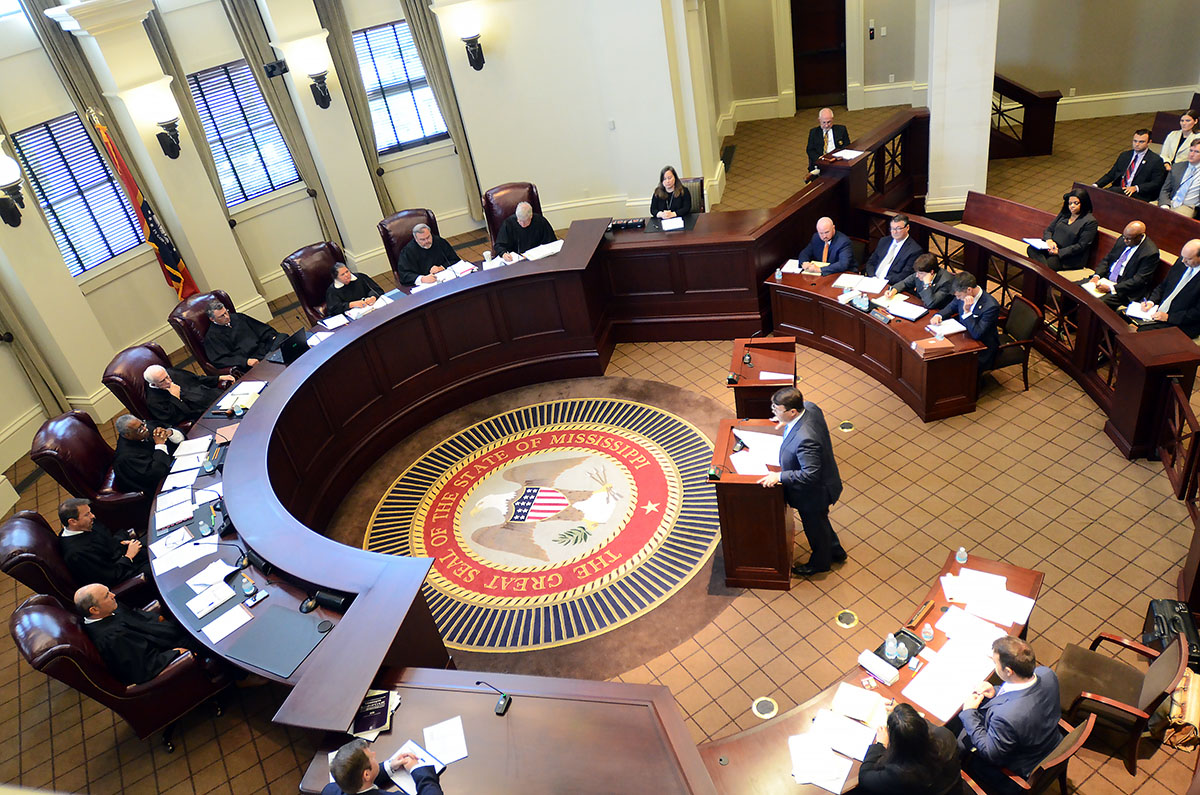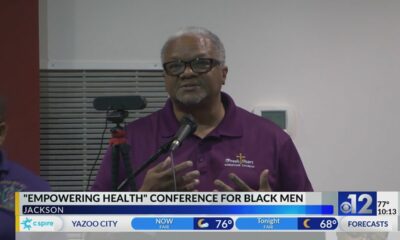Mississippi Today
Separate court in Jackson legit, Supreme Court says, but not appointed judges

The creation of a separate court system in Jackson is valid, the Mississippi Supreme Court ruled Thursday, but appointing judges who would work alongside elected judges in the Hinds County Circuit Court is unconstitutional.
In an 8-0 decision, the Supreme Court reversed and rendered the claim that the appointment of four special, temporary judges to the Hinds County Circuit Court was lawful. Specifically, the justices found House Bill 1020 violates the state constitution's requirement that circuit court judges be elected by the people for a term of four years.
“In short, reading the plain language of the statute, we find the new Section 1 judges are just unelected circuit judges, appointed into the Seventh Circuit Court District to serve three-and-a-half years instead of four,” Justice James Maxwell wrote in the majority opinion.
“Even viewing Section 1's language with a strong eye towards validity, we find Section 153's express election requirement prohibits these particular circuit court judgeships, which are appointed for a term, and not elected,” the opinion reads. “Thus, Section 1 cannot survive constitutional scrutiny.”
The justices who joined the majority opinion were Josiah Coleman, Dawn Beam, Robert Chamberlin, David Ishee and Kenneth Griffis. Justice James Kitchens concurred in part and dissented in a separate order joined by Justice Leslie King. Chief Justice Michael Randolph recused himself from the appeal.
The law created the Capitol Complex Improvement District court to handle cases stemming from Capitol Police arrests within the district and across Jackson. The law also directs the chief justice to appoint four temporary judges to work alongside elected Hinds circuit judges.
The justices said there is no constitutional barrier for the chief justice to appoint special judges to the Hinds County court or any judicial district in the state facing “exigent circumstances,” such as emergencies and to address backlogs, according to the order.
In the Thursday ruling, the justices also affirmed several aspects of HB 1020.
The majority ruling dismissed Randolph as a defendant in the lawsuit based on judicial immunity, which is a legal practice that shields judges from civil lawsuits when they perform judicial acts. Randolph's attorneys have argued his appointments under HB 1020 would be a judicial act.
Hinds County Circuit Clerk Zack Wallace was also dismissed as a defendant.
The majority agreed with Hinds County Chancery Court Judge Dewayne Thomas that the creation of the Capitol Complex Improvement District court is constitutional and that the Legislature has the authority to establish inferior courts like the CCID court as needed.
Kitchens and King, however, did not agree with the majority's decision to uphold the Capitol Complex Improvement District Court and that the Legislature had “a fatal constitutional deficiency” when it failed to place the proposed inferior court under the supervision of another constitutional court.
“Upholding the CCID court requires one to resort to a mind-reading exercise in statutory construction—that, because a statutory mechanism facilitating controlling authority by the circuit court must be present and should have been enacted, we will simply pretend that it is present and proceed as if it had been enacted in the real world,” Kitchens wrote.
“This fiction of convenience overreaches our judicial function and, of ultimate importance, our constitutional duty.”
He and King also raised concerns about how people who are convicted of misdemeanors would serve time. Those convicted in the CCID court would go to the Central Mississippi Correctional Facility, rather than a county jail, according to the order.
The ruling comes two months after justices heard oral arguments about the constitutionality of the law, and the appeal stems from a lawsuit filed on behalf of Jackson residents shortly after Gov. Tate Reeves signed the bill into law.
HB 1020 was supposed to go into effect July 1, but it was paused through a separate lawsuit in federal court. The temporary restraining order blocking the chief justice from making appointments is expected to be lifted pending a written order by U.S. District Court Judge Henry Wingate.
Wingate is overseeing another challenge to HB 1020 brought by the NAACP on behalf of Jackson residents and several groups, which argues that the separate court system is racially discriminatory and unconstitutional.
The U.S. Department of Justice has asked to intervene in the lawsuit, which to date, Wingate has not taken action on.
This article first appeared on Mississippi Today and is republished here under a Creative Commons license.
Mississippi Today
2024 Mississippi legislative session not good for private school voucher supporters
Despite a recent Mississippi Supreme Court ruling allowing $10 million in public money to be spent on private schools, 2024 has not been a good year for those supporting school vouchers.
School-choice supporters were hopeful during the 2024 legislative session, with new House Speaker Jason White at times indicating support for vouchers.
But the Legislature, which recently completed its session, did not pass any new voucher bills. In fact, it placed tighter restrictions on some of the limited laws the state has in place allowing public money to be spent on private schools.
Notably, the Legislature passed a bill that provides significantly more oversight of a program that provides a limited number of scholarships or vouchers for special-needs children to attend private schools.
Going forward, thanks to the new law, to receive the vouchers a parent must certify that their child will be attending a private school that offers the special needs educational services that will help the child. And the school must report information on the academic progress of the child receiving the funds.
Also, efforts to expand another state program that provides tax credits for the benefit of private schools was defeated. Legislation that would have expanded the tax credits offered by the Children's Promise Act from $8 million a year to $24 million to benefit private schools was defeated. Private schools are supposed to educate low income students and students with special needs to receive the benefit of the tax credits. The legislation expanding the Children's Promise Act was defeated after it was reported that no state agency knew how many students who fit into the categories of poverty and other specific needs were being educated in the schools receiving funds through the tax credits.
Interestingly, the Legislature did not expand the Children's Promise Act but also did not place more oversight on the private schools receiving the tax credit funds.
The bright spot for those supporting vouchers was the early May state Supreme Court ruling. But, in reality, the Supreme Court ruling was not as good for supporters of vouchers as it might appear on the surface.
The Supreme Court did not say in the ruling whether school vouchers are constitutional. Instead, the state's highest court ruled that the group that brought the lawsuit – Parents for Public Schools – did not have standing to pursue the legal action.
The Supreme Court justices did not give any indication that they were ready to say they were going to ignore the Mississippi Constitution's plain language that prohibits public funds from being provided “to any school that at the time of receiving such appropriation is not conducted as a free school.”
In addition to finding Parents for Public Schools did not have standing to bring the lawsuit, the court said another key reason for its ruling was the fact that the funds the private schools were receiving were federal, not state funds. The public funds at the center of the lawsuit were federal COVID-19 relief dollars.
Right or wrong, The court appeared to make a distinction between federal money and state general funds. And in reality, the circumstances are unique in that seldom does the state receive federal money with so few strings attached that it can be awarded to private schools.
The majority opinion written by Northern District Supreme Justice Robert Chamberlin and joined by six justices states, “These specific federal funds were never earmarked by either the federal government or the state for educational purposes, have not been commingled with state education funds, are not for educational purposes and therefore cannot be said to have harmed PPS (Parents for Public Schools) by taking finite government educational funding away from public schools.”
And Southern District Supreme Court Justice Dawn Beam, who joined the majority opinion, wrote separately “ to reiterate that we are not ruling on state funds but American Rescue Plan Act (ARPA) funds … The ARPA funds were given to the state to be used in four possible ways, three of which were directly related to the COVID -19 health emergency and one of which was to make necessary investments in water, sewer or broadband infrastructure.”
Granted, many public school advocates lamented the decision, pointing out that federal funds are indeed public or taxpayer money and those federal funds could have been used to help struggling public schools.
Two justices – James Kitchens and Leslie King, both of the Central District, agreed with that argument.
But, importantly, a decidedly conservative-leaning Mississippi Supreme Court stopped far short – at least for the time being – of circumventing state constitutional language that plainly states that public funds are not to go to private schools.
And a decidedly conservative Mississippi Legislature chose not to expand voucher programs during the 2024 session.
This article first appeared on Mississippi Today and is republished here under a Creative Commons license.
Mississippi Today
On this day in 1925


MAY 19, 1925

Malcolm X was born Malcolm Little in Omaha, Nebraska. When he was 14, a teacher asked him what he wanted to be when he grew up and he answered that he wanted to be a lawyer. The teacher chided him, urging him to be realistic. “Why don't you plan on carpentry?”
In prison, he became a follower of Nation of Islam leader Elijah Muhammad. In his speeches, Malcolm X warned Black Americans against self-loathing: “Who taught you to hate the texture of your hair? Who taught you to hate the color of your skin? Who taught you to hate the shape of your nose and the shape of your lips? Who taught you to hate yourself from the top of your head to the soles of your feet? Who taught you to hate your own kind?”
Prior to a 1964 pilgrimage to Mecca, he split with Elijah Muhammad. As a result of that trip, Malcolm X began to accept followers of all races. In 1965, he was assassinated. Denzel Washington was nominated for an Oscar for his portrayal of the civil rights leader in Spike Lee's 1992 award-winning film.
This article first appeared on Mississippi Today and is republished here under a Creative Commons license.
Did you miss our previous article…
https://www.biloxinewsevents.com/?p=359877
Mississippi Today
On this day in 1896


MAY 18, 1896

The U.S. Supreme Court ruled 7-1 in Plessy v. Ferguson that racial segregation on railroads or similar public places was constitutional, forging the “separate but equal” doctrine that remained in place until 1954.
In his dissent that would foreshadow the ruling six decades later in Brown v. Board of Education, Justice John Marshall Harlan wrote that “separate but equal” rail cars were aimed at discriminating against Black Americans.
“In the view of the Constitution, in the eye of the law, there is in this country no superior, dominant, ruling class of citizens,” he wrote. “Our Constitution in color-blind and neither knows nor tolerates classes among citizens. In respect of civil rights, all citizens are equal before the law. The humblest is the peer of the most powerful. The law … takes no account of his surroundings or of his color when his civil rights as guaranteed by the supreme law of the land are involved.”
This article first appeared on Mississippi Today and is republished here under a Creative Commons license.
Did you miss our previous article…
https://www.biloxinewsevents.com/?p=359301
-
Our Mississippi Home7 days ago
Beat the Heat with Mississippi’s Best Waterparks
-
SuperTalk FM4 days ago
State auditor cracking down on Mississippians receiving unemployment benefits
-
Mississippi News Video6 days ago
Jackson has a gang problem
-
Local News3 days ago
Family files lawsuit after teen’s suicide in Harrison County Jail
-
Kaiser Health News7 days ago
Medicaid ‘Unwinding’ Decried as Biased Against Disabled People
-
Mississippi Today5 days ago
On this day in 1950
-
228Sports6 days ago
George County Pours Runs In 6A South State Title Victory At PRC
-
Local News Video5 days ago
In the Kitchen with J's Restaurant






































